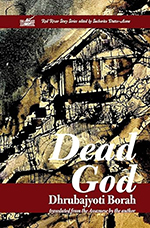Originally composed in the 1970s, Dhrubajyoti Borah’s novella Dead Gods remains disquietingly contemporary. It reflects a structural malaise that continues to haunt the North East Indian State of Meghalaya. The long story centres around the nexus of unregulated coal mining, hazardous labour conditions and the systemic exploitation of workers’ lives. It is framed around the fraught terrain of coal extraction and particularly the dangerous practice of rat-hole mining. It anticipates the persistence of extractive violence where cases of mine roof collapse, workers entombed alive and chronic disregard for safety regulations reveal an enduring crisis. Borah’s text becomes a socio-political diagnosis of an inhuman economic order.
The novella opens in the dense claustrophobia of a workers’ basti immediately after a mining accident. There is a tone of dread and uncertainty prevalent. The workers who are primarily Nepali and Bihari live a difficult life of poverty and hazard. Their decision to launch a one-day strike, a hartal, reeks of desperate pragmatism. It is an attempt to wrest from the mine owners minimal of safety guarantees. Yet, in an economy where human life is subordinated to coal’s market price, the owners are indifferent. The repeated petitions to mine owners do not bring any respite.
Borah renders the migrant workers’ social world with an acute ethnographic sensibility. Local labour is scarce and the migrant miners under the leadership of figures like Ramprasad and Krishna Bahadur carry the weight of extraction. Years of residence, intermarriage and kinship formation do little to dissolve their outsider status. Here, the novella gestures toward the anthropology of belonging in contested spaces. It lays bare the paradox of migrants who have lived in a place for decades yet remain permanently suspended in the category of the alien.
The workers’ engagement with the Bengali Babu who seeks to organize them into a union offers a fleeting moment of political possibility. His role in drafting a memorandum that calls for wage increases, improved working conditions, safety protocols and adequate compensation for injury or death introduces workers to the idea of labour rights. Yet, this solidarity proves fragile. Bengali Babu is attacked, threatened and told not to return. The mine owner also retaliates by laying off fifteen casual workers. He invokes the falling coal prices as a justification for inaction. Even subtle shifts in coal logistics such as moving coal from pit to depot become indices of managerial attempts to bypass workers’ leverage.
The novella also situates the miners’ struggles within the volatile identity politics of the region. Parallel to the strike, political agitation in distant Shillong against ‘infiltrators’ portrays the labourers’ demands for safety as an existential threat to the rights of indigenous tribals. The workers who are already marked as outsiders, become scapegoats for broader anxieties over demographic change. Violence follows predictably as arson attacks on workers’ huts, shutdown of mining operations and forced migration out of the coal belt. Miners like Ramprasad, Krishna Bahadur are driven into precarious menial labour with no economic security.
In the novella Dead Gods, class oppression is inextricable from the politics of indigeneity. The mine owners are figures of both economic and social capital. They profit from labour they do not deem worthy of dignified treatment. For the workers, the constant threat of displacement functions as a disciplinary mechanism. It ensures compliance even in the face of mortal danger.
Dead Gods collapses the boundaries between economic exploitation and cultural exclusion. It offers a close look at the anatomy of dispossession in Meghalaya’s coal economy. Its narrative resists closure and leaves the reader with an unsettling awareness of a bleak future. The mine owners’ decision to reopen the mine with fewer workers and heavy machines again point to the dangers of automation. The closing lines of the story in which Krishna Bahadur utters that gods are dead in the tunnels points to the helplessness that these marginalized sections face.
Parvin Sultana teaches Political Science at Pramathesh Barua College, Assam.

